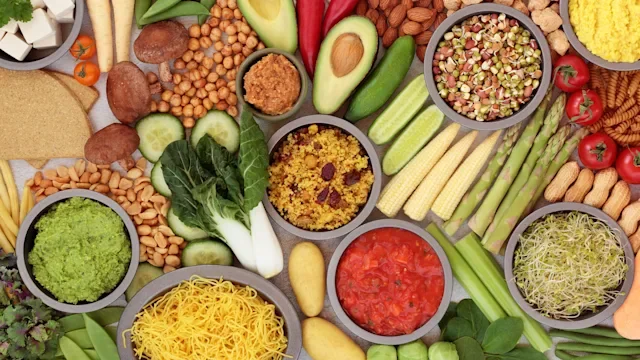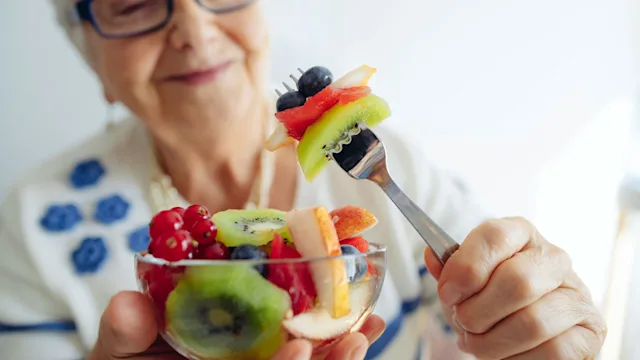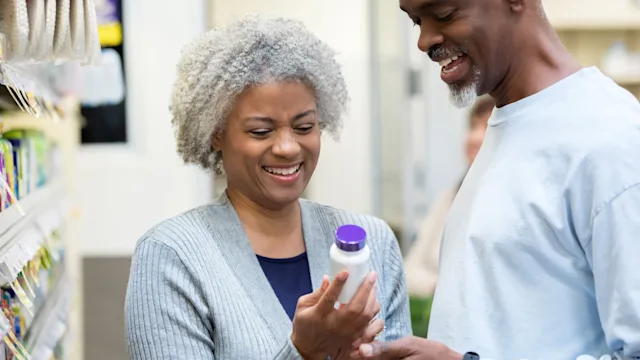Key takeaways:
Health influencers say that taking daily “shots” of olive oil is good for you. They claim it improves digestion, supports skin health, and helps with weight loss.
Olive oil has many health benefits. But drinking it doesn’t offer more benefits than using it in meals. In fact, adding olive oil to food helps your body absorb nutrients better.
If you want to drink olive oil, there’s no real harm in it. But it can cause stomach upset and add calories you may not need.
Extra virgin olive oil is the most nutrient-rich type of olive oil.
You may have seen wellness influencers drinking olive oil straight out of a shot glass, adding it to their morning coffee, or swirling it into lemon water. They claim there are many benefits of drinking olive oil, from improved digestion to glowing skin. Some even suggest that drinking olive oil can “detox” your body.
But is drinking olive oil really good for your health? Let’s break down what the science says — and what it doesn’t say — about the possible benefits of drinking olive oil.
Is drinking olive oil good for you?
There are several proven benefits of olive oil, including:
Decreasing your low-density lipoprotein (LDL or “bad”) cholesterol, which helps lower your risk of heart disease
Improving brain function
Lowering blood pressure
Decreasing inflammation
Reducing your risk of blood clots
Regulating blood sugar and lowering insulin resistance, both of which may help prevent Type 2 diabetes
But does drinking olive oil by itself provide more benefits than eating it as part of your meals? Let’s look at some of the claims made by health influencers — and what science actually says about each one.
Claim #1: It helps with weight loss
Health influencers say a morning shot of olive oil can help with weight loss by keeping you full and curbing cravings. There’s some truth to this, but it’s not the whole story.
Dietary fat helps you feel full in a few ways. It slows stomach emptying, which means that food stays in your digestive tract longer. It also triggers the release of hormones that signal fullness to your brain.
But you can get the same effect from adding olive oil — or another nutritious fat like avocado oil — to your meals. You don’t have to drink it.
Plus, olive oil has about 120 calories per tablespoon. If you add it on top of your usual meal, those calories can add up quickly and may make it harder to find a comfortable weight.
Claim #2: It improves digestion
There’s truth to the claim that olive oil supports digestion.
Drinks to boost gut health: These gut-friendly drinks support digestion. They also aid your immune system and other functions throughout your entire body.
Is lemon water good for you? Lemon water may improve digestion, decrease the risk of kidney stones, and help manage blood sugar. But there are a couple of downsides to be aware of.
Olives vs. olive oil: Both olives and olive oil have beneficial nutrients. But olives aren’t as well-researched, and there are reasons to limit how many you eat.
Is cucumber water healthy? Cucumber water has small amounts of nutrients. But its biggest benefits may simply be that it’s hydrating and free of calories and sugar.
The fat in olive oil can stimulate bile production and help lubricate your intestines, making bowel movements easier. Olive oil also contains polyphenols, natural plant compounds with antioxidant and anti-inflammatory properties.
Research suggests these polyphenols can promote the growth of good gut bacteria and protect your gut lining.
But there’s no research to suggest that drinking olive oil on an empty stomach increases these benefits. You’ll get the same digestive support by drizzling olive oil on a salad or using it in cooking. In fact, having olive oil (or other fats) with meals helps your body better absorb certain nutrients from your food. Examples include fat-soluble vitamins A, D, E, K, and beta-carotene.
It’s also important to note that drinking straight olive oil on an empty stomach can cause an upset stomach (more on this below).
Claim #3: It gives you glowing skin
In addition to its polyphenols, olive oil contains vitamin E and other antioxidants. These nutrients support skin health by:
Providing some protection from ultraviolet (UV) radiation
That said, most of the research on olive oil and skin health comes from studying the Mediterranean diet. This eating pattern also includes many fruits, vegetables, nuts, fish, and other healthy fats.
So yes, it’s true that olive oil can contribute to healthy skin. But it does so as part of a balanced diet, alongside other foods that boost skin health by providing hydration, omega-3 fatty acids, and collagen-stimulating nutrients.
Claim #4: It can improve brain health
There’s some truth here, too. The monounsaturated fats and polyphenols in olive oil can help protect brain cells from oxidative stress and inflammation. And research suggests that regularly consuming olive oil may support cognitive function and reduce the risk of age-related decline.
But it’s important to note that these benefits come from olive oil consumed over time as part of a Mediterranean-style diet. There’s no evidence that taking a tablespoon of olive oil first thing in the morning will immediately sharpen your focus, even though some TikTokers swear by it.
Claim #5: It can detox your body
Your liver, kidneys, and digestive system already work around the clock to process and remove toxins from your body.
That said, a nutrient-rich diet can help support these organs so they can function well. Aim for a balanced diet rich in fruits, vegetables, and healthy fats — and low in ultra-processed foods. The best way to support your body’s natural detox process is by maintaining a balanced diet and minimizing exposure to toxins.
Risks of drinking olive oil
While olive oil is generally safe and healthy, drinking it straight has downsides:
It can cause digestive upset. A sudden shot of olive oil can be rough on your stomach. It may cause nausea, diarrhea, or cramping in some people, especially if you’re not used to consuming that much fat at once.
The calories can add up quickly. In 1 tbsp of olive oil, there’s about 120 calories and 14 g of fat. That’s fine if it replaces another fat source in your diet. But if you’re adding olive oil shots on top of your regular diet, the extra calories could lead to weight gain over time.
It might interact with some medications. Olive oil may have a mild blood-thinning effect. Drinking large amounts could interfere with blood thinners or blood pressure medications. If you take any prescription medications, it’s best to avoid consuming excessive amounts of olive oil.
Drinking a thick liquid may be unappealing. Olive oil has a thick, greasy texture. It’s not meant for drinking. Some people find it slimy, unpleasant, or even nauseating to drink. This makes it a hard habit to stick with long term.
Regular olive oil vs. extra virgin olive oil
Not all olive oils are created equal — and the differences matter when it comes to health benefits.
Extra virgin olive oil (EVOO) is made by cold-pressing olives to extract their oil. This method doesn’t use heat or chemicals. The cold-pressing process preserves the natural vitamins, antioxidants, and polyphenols that give olive oil many of its health perks.
In contrast, regular olive oil (also called refined olive oil) is usually processed with heat and chemicals. This process increases the oil’s shelf life, gives it a higher smoke point, and mutes strong flavors. But the process also removes some of the beneficial antioxidants and polyphenols. This makes it less nutrient-dense than extra virgin olive oil.
For the most health benefits, EVOO is the better choice. That said, both types of olive oil contain monounsaturated fats. So if you only have regular olive oil, you’re still getting some benefits.
If you’re thinking about drinking olive oil straight, EVOO is the best olive oil to drink daily. This is because it contains higher amounts of the antioxidants that are responsible for the health boost. Regular olive oil won’t hurt you, but it won’t offer the same nutritional boost.
Frequently asked questions
Extra virgin olive oil (EVOO) is what most influencers use. It has more vitamins, antioxidants, and polyphenols than refined olive oils. EVOO also has a better flavor than refined olive oil, making it slightly easier to sip.
For most people, consuming 1 tbsp to 2 tbsp of olive oil per day is plenty — whether you’re drinking it or using it on foods. That’s enough to get the health benefits without overdoing calories or fat intake. If you’re new to drinking olive oil, start slowly. Try a smaller amount at first to see how your stomach tolerates it.
You can drink water afterward, but it’s not absolutely necessary. Some people find that drinking a glass of water after taking olive oil makes it easier to swallow. Water may also help wash away the strong taste and texture. If drinking olive oil on its own makes you feel queasy, try mixing it into lemon water, blending it into smoothies, or using in salad dressings instead.
Extra virgin olive oil (EVOO) is what most influencers use. It has more vitamins, antioxidants, and polyphenols than refined olive oils. EVOO also has a better flavor than refined olive oil, making it slightly easier to sip.
For most people, consuming 1 tbsp to 2 tbsp of olive oil per day is plenty — whether you’re drinking it or using it on foods. That’s enough to get the health benefits without overdoing calories or fat intake. If you’re new to drinking olive oil, start slowly. Try a smaller amount at first to see how your stomach tolerates it.
You can drink water afterward, but it’s not absolutely necessary. Some people find that drinking a glass of water after taking olive oil makes it easier to swallow. Water may also help wash away the strong taste and texture. If drinking olive oil on its own makes you feel queasy, try mixing it into lemon water, blending it into smoothies, or using in salad dressings instead.
The bottom line
Olive oil is good for you, but you don’t need to drink it on its own to get the health benefits. You’ll get the same nutrients by using it regularly in your meals. The real power of olive oil comes from using it consistently and as part of a Mediterranean-style eating pattern. Consuming olive oil in this way has benefits for your heart, brain, skin, and overall health. If you like sipping olive oil and it doesn’t bother your stomach, there’s no harm in consuming it that way. But for most people, the tastier (and more sustainable) option is to add it to food. Plus, adding olive oil to foods tastes good. It can bring out flavors, enhance textures, and make dishes more satisfying.

Why trust our experts?



References
Agrawal, K., et al. (2017). Oleocanthal-rich extra virgin olive oil demonstrates acute anti-platelet effects in healthy men in a randomized trial. Journal of Functional Foods.
American Heart Association. (2024). Dietary fats.
Calabriso, N., et al. (2023). Dietary polyphenols and their role in gut health. Nutrients.
Durazzo, A., et al. (2023). Editorial: Cold pressed oils: A green source of specialty oils, volume II. Frontiers in Nutrition.
Fazlollahi, A., et al. (2023). The effects of olive oil consumption on cognitive performance: A systematic review. Frontiers in Nutrition.
FoodData Central. (2020). Olive Oil. U.S. Department of Agriculture.
Gonçalves, M., et al. (2024). Neuroprotective effects of olive oil: A comprehensive review of antioxidant properties. Antioxidants.
Gorzynik-Debicka, M., et al. (2018). Potential health benefits of olive oil and plant polyphenols. International Journal of Molecular Sciences.
Guasch-Ferré, M., et al. (2020). Olive oil consumption and cardiovascular risk in U.S. adults. JACC.
Jackson, A., et al. (2017). The efficacy of a low-fat diet to manage the symptoms of bile acid malabsorption – outcomes in patients previously treated for cancer. Clinical Medicine.
Klimova, B., et al. (2019). Effect of an extra-virgin olive oil intake on the delay of cognitive decline: Role of secoiridoid oleuropein? Neuropsychiatric Disease and Treatment.
Lopez, S., et al. (2016). Virgin olive oil and hypertension. Current Vascular Pharmacology.
Massaro, M., et al. (2020). Effects of olive oil on blood pressure: Epidemiological, clinical, and mechanistic evidence. Nutrients.
Melguizo-Rodríguez, L., et al. (2022). Biological effects of the olive tree and its derivatives on the skin. Food & Nutrition.
Miller, L. J., et al. (2021). Roles of cholecystokinin in the nutritional continuum. Physiology and potential therapeutics. Frontiers in Endocrinology.
Millman, J. F., et al. (2021). Extra-virgin olive oil and the gut-brain axis: Influence on gut microbiota, mucosal immunity, and cardiometabolic and cognitive health. Nutrition Reviews.
My Food Data. (n.d.). Olive oil.
National Institutes of Health. (2018). Mediterranean diet may slow development of Alzheimer’s disease.
Omar, S. H. (2010). Oleuropein in olive and its pharmacological effects. Scientia Pharmaceutica.
Rath, L. (2023). Benefits of olive oil for arthritis. Arthritis Foundation.
Salas-Salvadó, J., et al. (2011). Reduction in the incidence of type 2 diabetes with the Mediterranean diet: Results of the PREDIMED-Reus nutrition intervention randomized trial. Diabetes Care.
Schwingshackl, L., et al. (2015). Effects of olive oil on markers of inflammation and endothelial function—a systematic review and meta-analysis. Nutrients.
Violi, F., et al. (2015). Extra virgin olive oil use is associated with improved post-prandial blood glucose and LDL cholesterol in healthy subjects. Nutrition & Diabetes.














